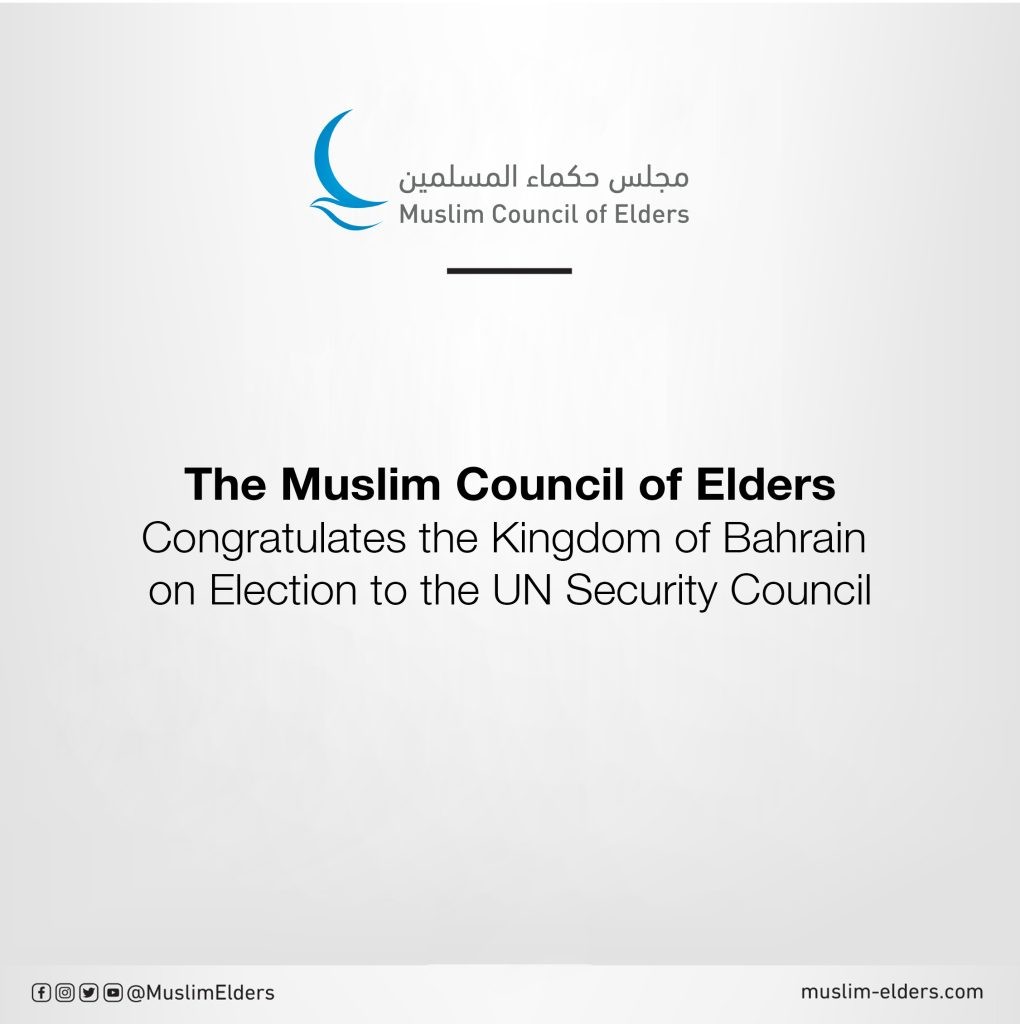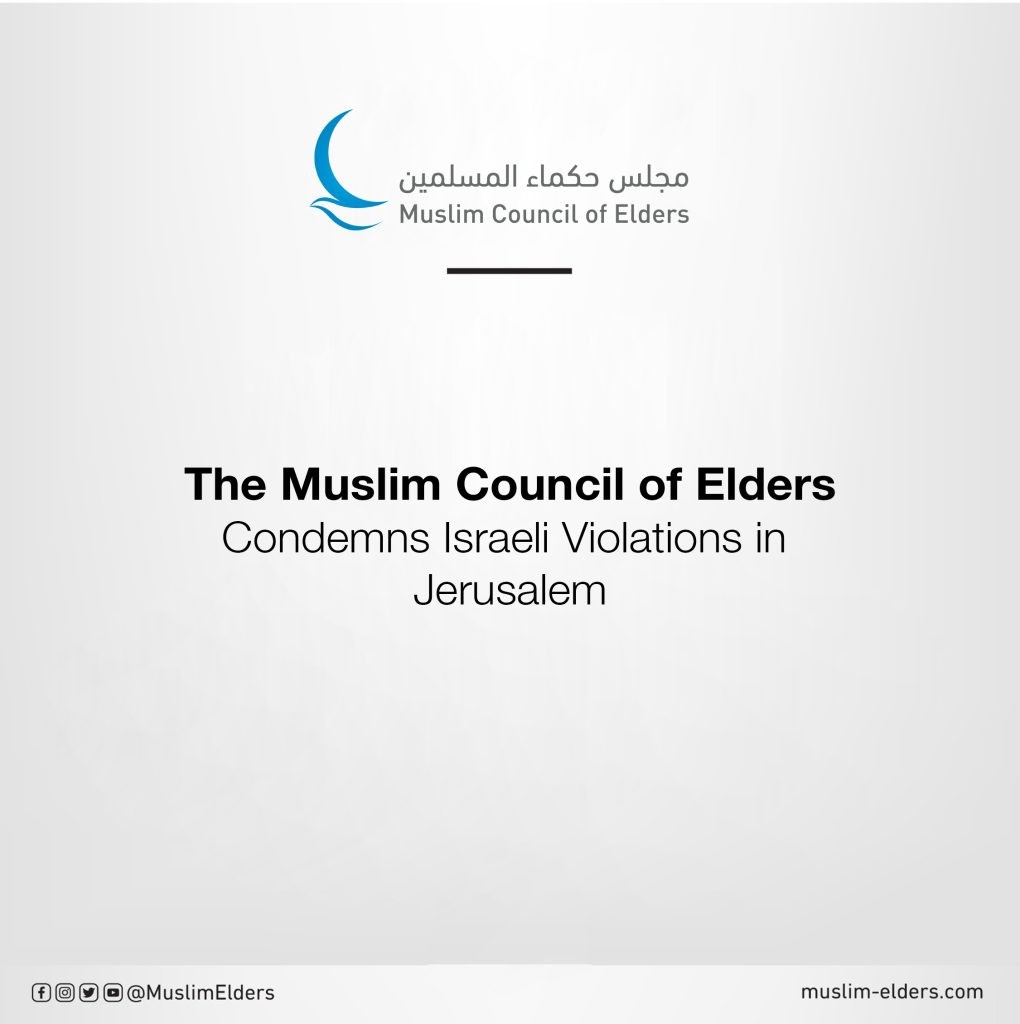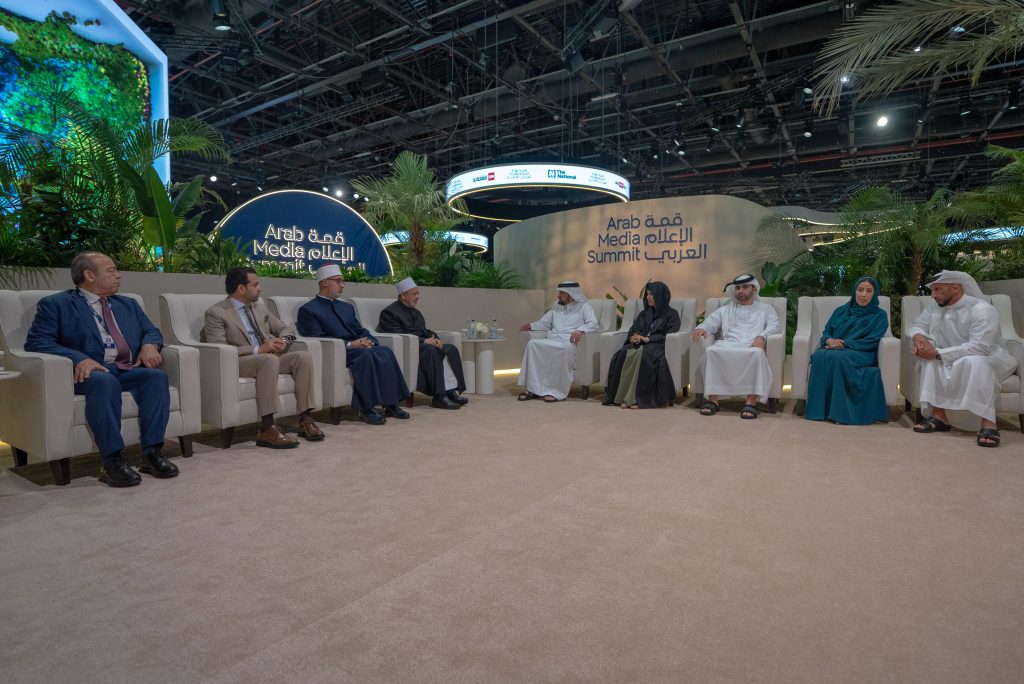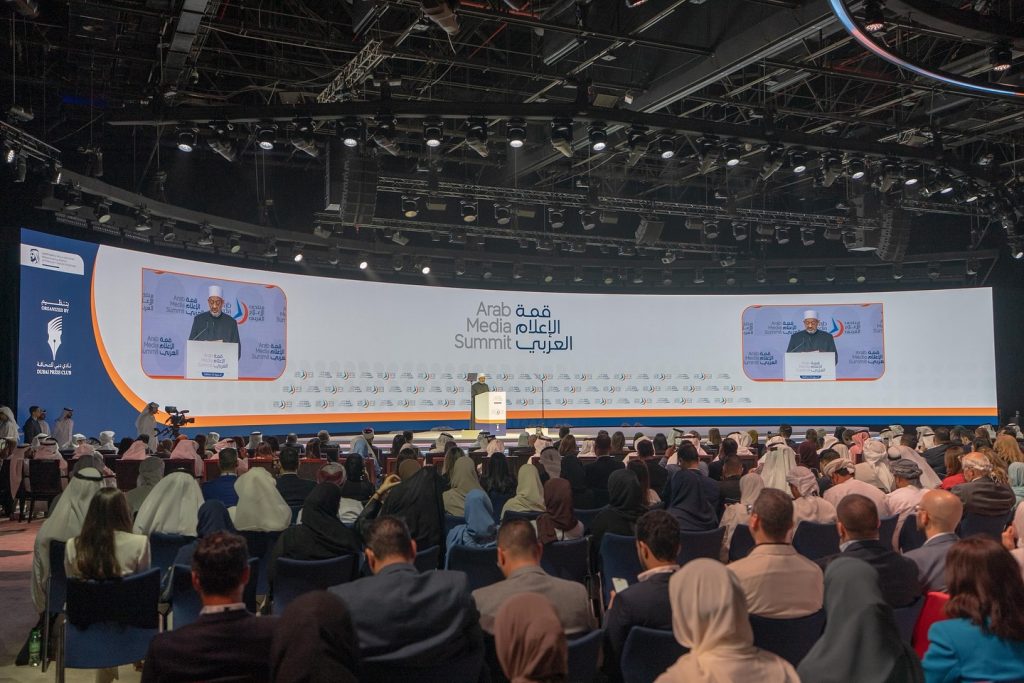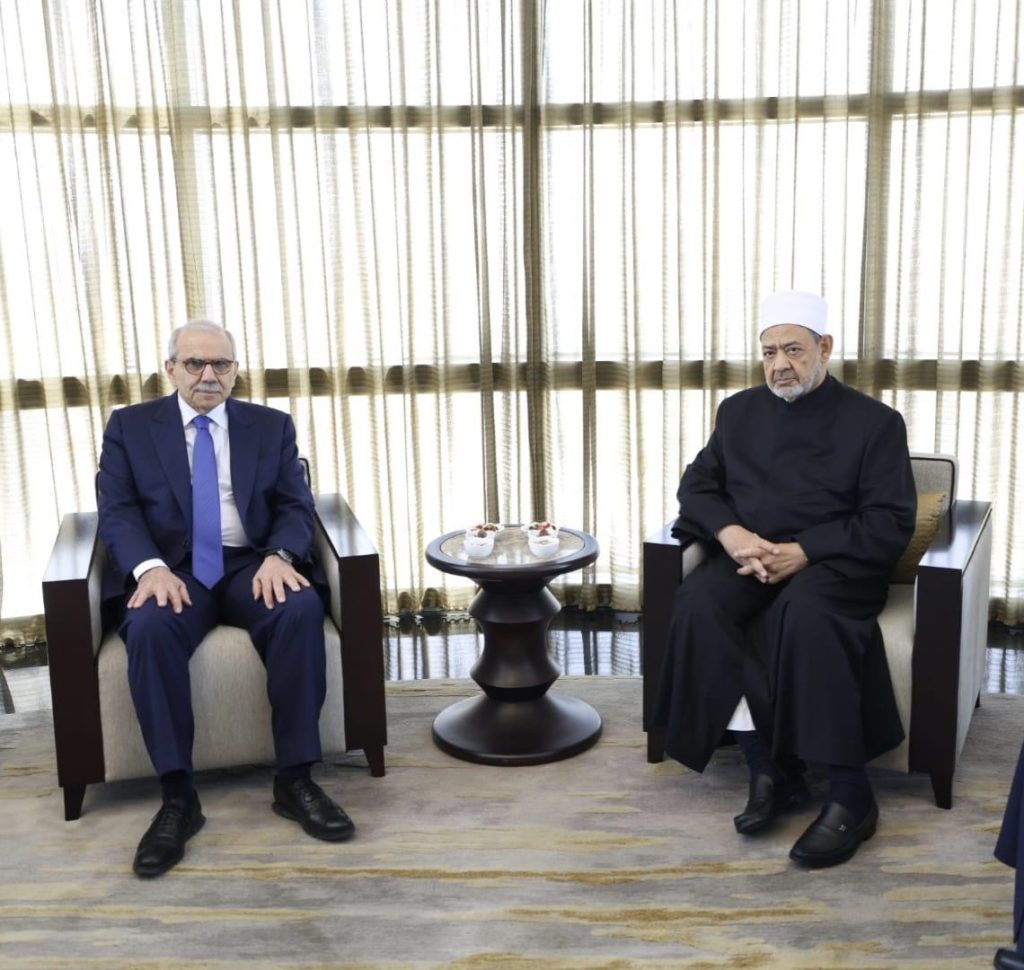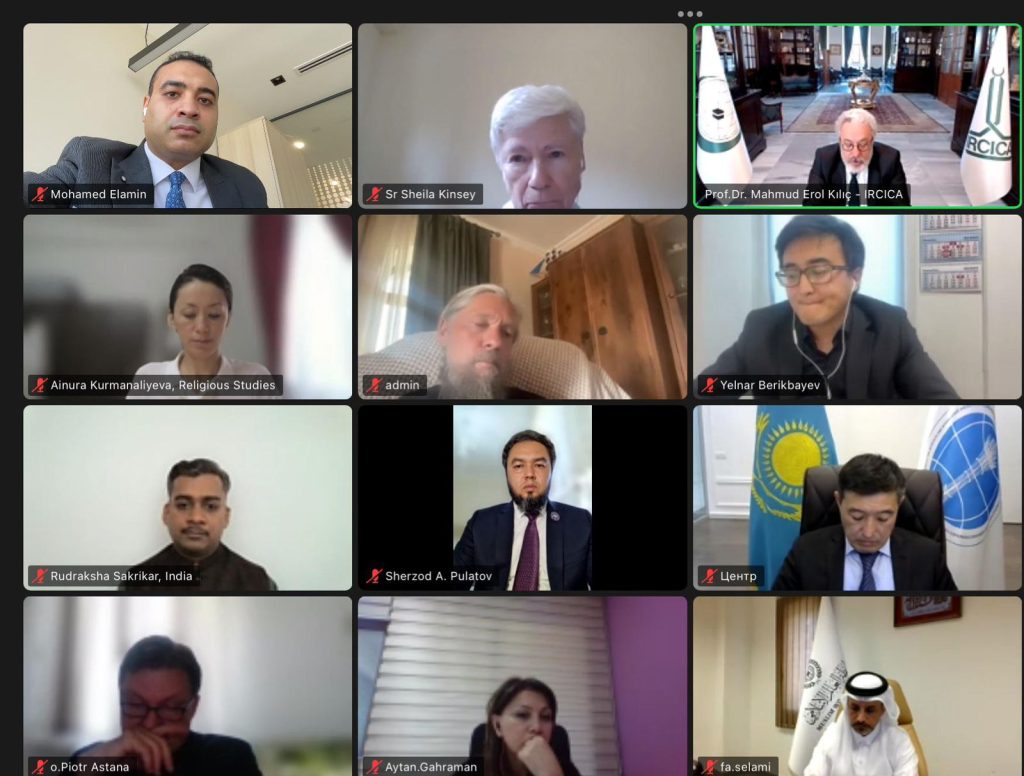At his keynote address opening the Arab Media Summit in Dubai, His Eminence Professor Dr. Ahmed Al-Tayeb, Grand Imam of Al-Azhar and Chairman of the Muslim Council of Elders, calls for an Arab media strategy that safeguards identity and upholds the causes of the Ummah
The Grand Imam unveils a forthcoming global document on AI ethics, initiated in collaboration with the late Pope Francis, and confirms ongoing coordination with the Vatican under its new leadership to complete the project.
The Grand Imam: Islamophobia is no more than a delusion—a pathological fantasy crafted to defame Islam and undermine its foundations of peace and coexistence.
Delivering the keynote address at the opening of the Arab Media Summit in Dubai, His Eminence Professor Dr. Ahmed Al-Tayeb, Grand Imam of Al-Azhar and Chairman of the Muslim Council of Elders, called for the development of an actionable and comprehensive Arab media strategy—one that defends truth, upholds values, articulates the concerns of the Arab and Muslim worlds, and preserves cultural and spiritual identity. His Eminence warned of the dangers posed by digital platforms that manipulate young people’s emotions, disconnect them from the realities of their Ummah, and blur the boundaries between virtue and vice, all while promoting misleading slogans such as progress, openness, and modernity.
His Eminence extended his sincere gratitude to the United Arab Emirates and to His Highness Sheikh Mohammed bin Rashid Al Maktoum, Vice President, Prime Minister, and Ruler of Dubai, as well as to the Dubai Press Club, for organizing this landmark media forum. Now approaching a quarter of a century since its launch, the Arab Media Summit has become a prominent platform for dialogue in the Arab and Islamic media landscape. His Eminence commended the forum’s focus on the role of Arab media in navigating the complex ethical challenges of our time amid a rapidly changing world marked by technological advances and compounding humanitarian and ethical crises.
The Grand Imam added: “We, Arabs and Muslims, have long endured media narratives and reports crafted to distort our image in the minds of the West. These portrayals have repeatedly linked Islam to violence, extremism, and the oppression of women—falsely depicting it not as a religion or civilization, but as a radical movement or political ideology that incites hatred, violence, and rebellion against the global order.” He emphasized that Western media has led the way in promoting these falsehoods and continues to do so.
His Eminence the Grand Imam of Al-Azhar and Chairman of the Muslim Council of Elders expressed his deep regret that many of the misleading and distorted media portrayals have found their way into our own societies. These false images have had profoundly negative and disorienting effects on Arab media discourse. He noted that certain individuals from within our own communities have excelled in promoting a counterfeit culture—one preoccupied with criticizing everything of Arab origin or Islamic thought and orientation. This has only intensified the challenges we face today, foremost among them the widening gap between our contemporary consciousness and a heritage that, until recently, stood as one of the greatest sources of our pride, dignity, and resilience in the face of those seeking to undermine the past and present of this Ummah.
Regarding the media’s coverage of the aggression on Gaza, His Eminence affirmed that no just observer—whether in the East or the West—can deny that the cause which should take center stage in Arab media coverage is the tragedy of Gaza: the wars and devastation it has endured, along with the horrific violations that have accompanied it—violations that have been, and continue to be, denounced and condemned by people of conscience around the world for nineteen consecutive months. He stressed that Arab media carries a historic responsibility to continuously highlight the suffering of the rightful owners of the land, to showcase the resilience of this steadfast people and their unwavering connection to their homeland, and to keep the Palestinian cause alive in the hearts and minds of people across the world.
The Grand Imam also welcomed the shift in the positions of many European Union countries regarding the ongoing events in Gaza, commending the awakening of their noble human conscience. He likewise praised the steadfast Arab stance in confronting the machinery of aggression and calling for an immediate ceasefire and the facilitation of humanitarian and relief aid, despite the obstinance of the occupying force. His Eminence concluded by saluting all the free voices around the world who recognize what is unfolding as a grave humanitarian crime that must be brought to an immediate end.
On the rising issue of Islamophobia, His Eminence called for intensified media efforts to confront this illegitimate phenomenon. He noted:
“Islamophobia is no more than a delusion—a pathological fantasy crafted to malign Islam and discredit its principles of peace and coexistence.” He emphasized that Islam enshrines the rights of human beings, animals, and the environment—rights that are unmatched in many contemporary legal and political systems. He asserted that the tragedy unfolding in Gaza has exposed the double standards of those who once boasted of such values while accusing us of lacking them.
His Eminence also criticized the broader assault on Eastern civilizations and ethical systems by some in Western media, which he said go beyond the distortion of Islam to target the foundational values of family and human relations in Eastern societies. He condemned calls to erase these values under the guise of personal freedom—even when such calls result in the breakdown of the family unit, the erosion of children’s rights, and the normalization of behaviors rejected by religious teachings, moral conscience, and cultural norms. He warned that such efforts—including the promotion of same-sex marriage, atheism, and rebellion against faith—represent a dangerous attempt to undermine the sources of strength, independence, and pride in Arab and Islamic identity. “These efforts,” he warned, “place a great responsibility on our shoulders—particularly on media professionals—to reflect seriously on how best to resist these destructive trends and safeguard our youth and nations from cultural erasure and moral disintegration.”
Recognizing the urgent need to keep pace with technological development, His Eminence stressed that the rapid advancement of artificial intelligence must be accompanied by clear ethical frameworks and professional safeguards. Without such measures, he warned, AI could become a dangerous force that threatens humanity itself. He called on experts and lawmakers to protect these technologies from deviation or misuse, guided by humanitarian principles that reject hegemony, exploitation, and cultural domination.
The Grand Imam revealed that he had initiated, together with the late Pope Francis, an international document on the ethics of artificial intelligence. The project had reached an advanced stage before the Pope’s passing, and discussions are now ongoing with the Vatican’s new leadership to finalize this important initiative.
Turning to the plight of journalists and correspondents in war zones—particularly in Gaza—His Eminence expressed heartfelt solidarity with Palestinian journalists and others who have paid the ultimate price in defense of truth and the sanctity of honest reporting. He noted that more than 200 journalists and reporters have been killed in Gaza, while many others have suffered grave injuries, the destruction of their homes, or the loss of their families.
He condemned these systematic attacks as a deliberate attempt to silence the voice of truth, erase critical documentation, and prevent justice from being served. “It is,” he said, “an attempt to prevent the world from seeing and understanding the full scope of this aggression.”
In conclusion, His Eminence called upon all those who belong to this noble profession of media and journalism to actively contribute to formulating a unified Arab media strategy—a strategy that stands as a shield for truth and protects the values and identity of our Ummah. He affirmed that Al-Azhar is ready and eager to stand alongside them in fulfilling this noble and sacred duty.


